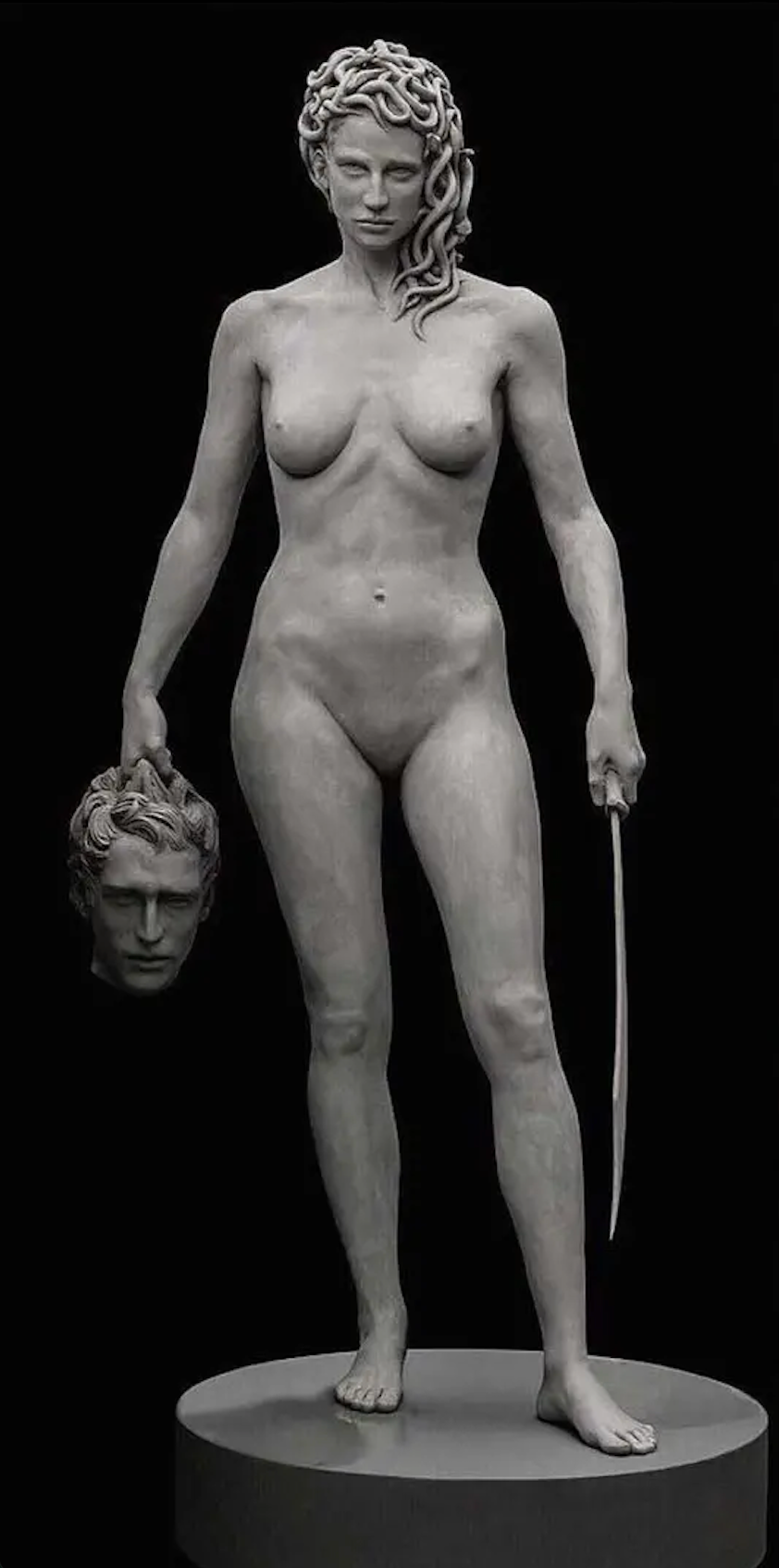Medusa in Art and Why Is Her Story Relevant Today?
- Lucy

- Jun 4, 2024
- 4 min read
Updated: Jun 8, 2024
[BLOG POST 6/4/24] Warning: This post includes images of classic sculptures depicting violence against women and a retelling of Medusa's origin story which also incudes violence.
Recently I went on a delightful mini-retreat with a dear friend and our conversation ran the gamut ranging from relationships to how violence against women is accepted in our society to mental health.
It was wonderful and we both left feeling rejuvenated. However, our time spent talking about violence against women stuck with me in no small part due to how many of my "Rattlesnake" models, other friends, and myself have all experienced it.
Thinking I might be jumping to conclusions I looked online and found the following statistic from the National Coalition Against Domestic Violence:
1 in 4 women (25%) experience severe intimate partner physical violence, intimate partner contact sexual violence, and/or intimate partner stalking with impacts such as injury, fearfulness, post-traumatic stress disorder, use of victim services, contraction of sexually transmitted diseases, etc.
And in New Mexico it's even higher:
37.6% of New Mexican women experience intimate partner physical violence, intimate partner sexual violence and/or intimate partner stalking in their lifetimes.
As I drove and the miles turned into hours I tuned into the latest "The Great Women Artists" podcast by Katy Hessel interviewing the author Natalie Haynes which just happened to be about her new book on Medusa. As the miles zipped by I learned that the earliest recorded stories of Medusa included violence. And that those stories inspired great art.
Dear reader what do you remember about Medusa?
Probably that she had snakes for hair, that she could turn people into stone with a look, and that she was killed by Perseus. That's pretty much all I learned from the 1981 movies "Clash of the Titans":
But there is much more to the myth than that.
According to the oldest surviving writings from Greece / Rome Medusa was the daughter of the ancient deities of Phorcys (a primordial sea god) and Ceto (a sea monster). She had two sisters who were immortal but she was not. But, Medusa was noted for being beautiful.
Does that make up for not being immortal? If you had too chose between being "ugly" and immortal or "beautiful" and mortal which would you chose?
And, here is a separate question, do you automatically equate beauty with goodness and ugliness with evil? If so, why? According to one scholar that connection between appearance and perceived "goodness" can be partially traced back to this story of Medusa.
Anyway, Medusa caught the god Neptune's eye and while she was worshiping in Athena's temple he raped her. Athena was there and didn't stop it nor did she protest. In fact she hid her eyes and was so offended by the act that she punished, guess who, the mortal woman. She cursed Medusa to have snakes for hair and made her eyes a weapon.
I couldn't find any art for this part of the story thankfully but why? Is it because raping women was so commonplace that it didn't warrant being captured in art? Or because it was assumed a mortal woman would be happy to have sex with a god? Or would it have been considered "pornographic" by the ancients and therefore not suitable for art?
The next part of the story has inspired a LOT of art and again I wonder why. Is it because we love violence? Or maybe we love our male heroes so much that we must show them being victorious even when that includes violence, especially against women? Or maybe some of us want to see women as monsters enjoy it when they are defeated by strong men? What does it say when violence is ok to carve into stone?
Medusa and her sisters promptly retreated to live in a cave far away from people theoretically because she didn't want to harm anyone. All was calm until the demigod Perseus shows up on an errand from an awful king who was hoping the mission to cut off Medusa's head would kill Perseus. Unfortunately for both Medusa and the king, Perseus succeeds. He sneaks into the cave while the three women are sleeping - while they were sleeping - and cuts off Medusa's head with the help of a mirrored shield.
And here comes the art.
Whereas the art is exquisite, the subject matter is highly questionable. When I was a young girl I loved the stories of the ancient Greek and Roman gods and goddesses. They seemed exciting, amazing, and yet somehow still relatable. Now, as an adult, I see them as petty, spiteful, and as examples of the worst ways humans treat one another. Hardly something to be celebrated and emulated! Rather I see them as cautionary tales. What NOT to do.
Recently Argentine-Italian artist Luciano Garbati turned the tables and sculpted Medusa holding a sword in one hand and and the head of Perseus in the other.

My question to you dear reader is which was more shocking? The artwork featuring Perseus holding Medusa's head or Medusa holding Perseus' head?
And why did it take so long for someone to turn the tables/flip the story?
In the podcast the author Natalie Haynes says she was surprised to realize she was more shocked by Medusa holding Perseus' head. She attributes her reaction to how commonplace violence against women is in history, art, and our current society.
Personally I don't like violence and all these violent compositions make me uncomfortable. But I appreciate the stories being told and how they are represented. Additionally I was both interested in and saddened by how violence against women and art have connected dating back to very early times in human history. Quite possibly because violence against women is as old as time.
sigh
What about you? What did you think about the "#MeToo" sculpture vs. the earlier sculptures? What questions are you thinking about?
If Medusa interests you, and I hope it does because there is a LOT more to her story, her influence in art, what her story and how it's told tells us about ourselves, and her popularity in modern day tattoos, I recommend the following resources as a good start:
The Great Women Artists podcast episode "Natalie Haynes on Medusa"
"Stone Blind: A Novel" by Natalie Haynes
Multiple Medusa themed podcasts on "Let's Talk About Myths Baby" by Liv Albert











Comments